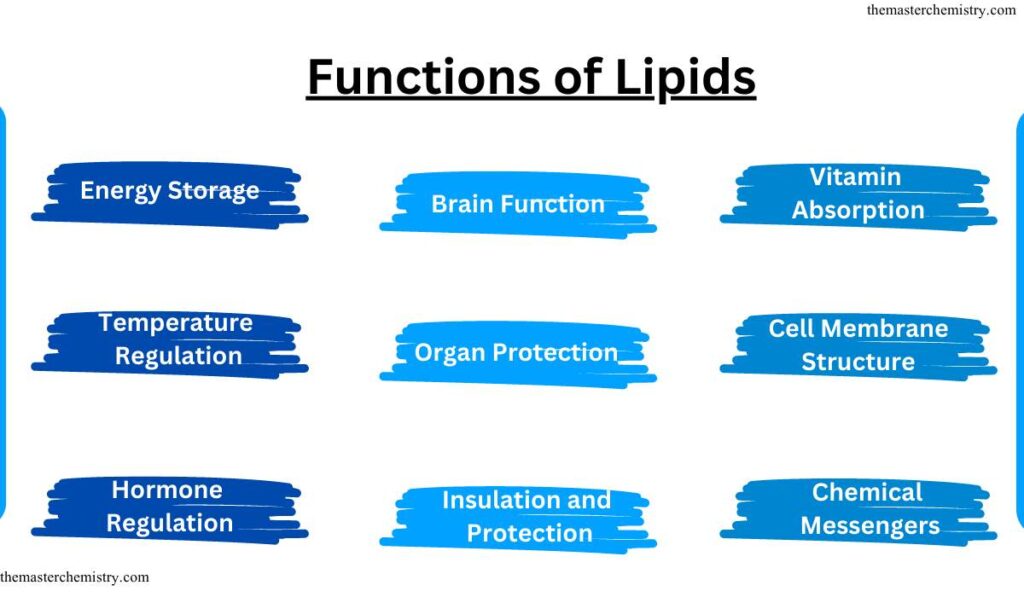Lipids perform important functions in the human body, from storing energy and regulating temperature to forming cell membranes and supporting vital functions in both animal and plant cells. They are a source of metabolic energy for reproduction, movement, and migration. [source]
In this article, we will discuss the most important functions of lipids.

Functions of Lipids
Table of Contents
Lipids perform following function in living organism’s body:
1. Role of Lipids in Energy Storage
It is one of the most important function of lipid.
- Lipids serve as the primary form of energy storage in the human body.
- Excess energy from food is stored as triglycerides in fat cells.
- Lipids can store twice as much energy as carbohydrates, providing a long-lasting energy reserve.
- This stored energy is essential for activities like heavy exercise, where muscles need a continuous supply of fuel.
2. Role of Lipids in Temperature Regulation
- Certain lipids, such as triglycerides, play a role in maintaining the body’s constant temperature.
- Adequate fat reserves help keep the body insulated and retain heat.
- People with insufficient fat may experience feelings of coldness and fatigue.
3. Role of Lipids in Hormone Regulation
- Lipids in fat cells play a significant role in regulating hormones, such as leptin.
- Leptin is a hormone that influences appetite control and metabolism.
4. Role of Lipids in Supporting Reproductive System
- Fatty acids are essential for the proper functioning of the reproductive system.
- Inadequate fatty acids can lead to menstrual irregularities and infertility in women.
5. Role of Lipids in Brain Function
- Fatty acids are crucial for brain health and activity.
- They help protect and insulate nerve cells, ensuring smooth communication between brain cells.
6. Role of Lipids in Organ Protection
- Lipids, particularly visceral fats, provide protection to vital organs like the brain, heart, and kidneys.
7. Role of Lipids in Insulation and Protection
- Subcutaneous fats under the skin help regulate body temperature and protect the body from physical impacts.
8. Role of Lipids in Vitamin Absorption
- Lipids facilitate the absorption of fat-soluble vitamins (A, D, E, and K), which are essential for various bodily functions.
9. Role of Lipids in Cell Membrane Structure
Membrane lipids perform following functions:
- Lipids are fundamental building blocks of the cell membrane. [source]
- They contribute to the cell’s structure and integrity, forming a protective barrier around the cell.
- Lipids also regulate what substances can enter and exit the cell, ensuring proper cellular functioning.
10. Role of Lipids in the Human Body
- Lipids play a crucial role in maintaining overall health and well-being.
- They serve as an efficient energy reserve and help control body temperature.
- Lipids are vital for hormonal balance, supporting reproductive functions and appetite regulation.
- In the brain, lipids aid in proper neurological activity and nerve cell communication.
- Lipids also provide insulation and protection to organs and the body’s surface.
- They are essential for the absorption of fat-soluble vitamins and contribute to cell membrane structure.
11. Role of Lipids in Animal Cell
- Lipids are essential components of the cell membrane, providing structural support and forming a protective barrier around the cell.
- They help regulate the movement of substances in and out of the cell, ensuring proper cellular function.
- Lipids serve as a source of energy, providing fuel for various cellular processes.
12. Role of Lipids in Plant Cell
Lipids are one of the most important component of plant cell. It performs following functions.
- Lipids are vital components of the cell membrane in plant cells, contributing to its structure and integrity.
- They help store energy in the form of oils and fats in plant seeds, providing a reserve for germination and early growth.
- Lipids also play a role in forming protective layers, such as the waxy cuticle on leaves, reducing water loss and protecting against environmental stresses.